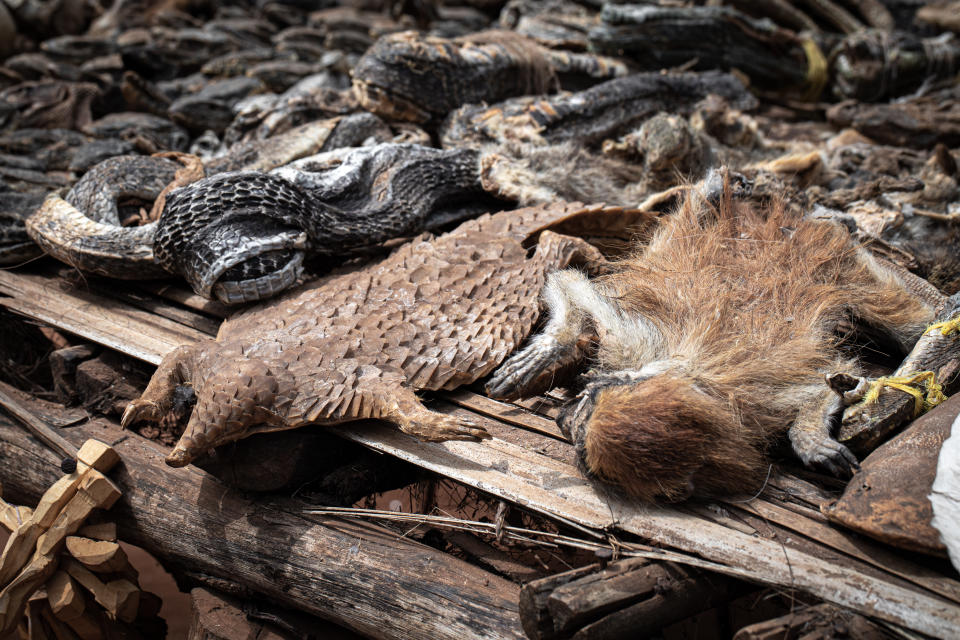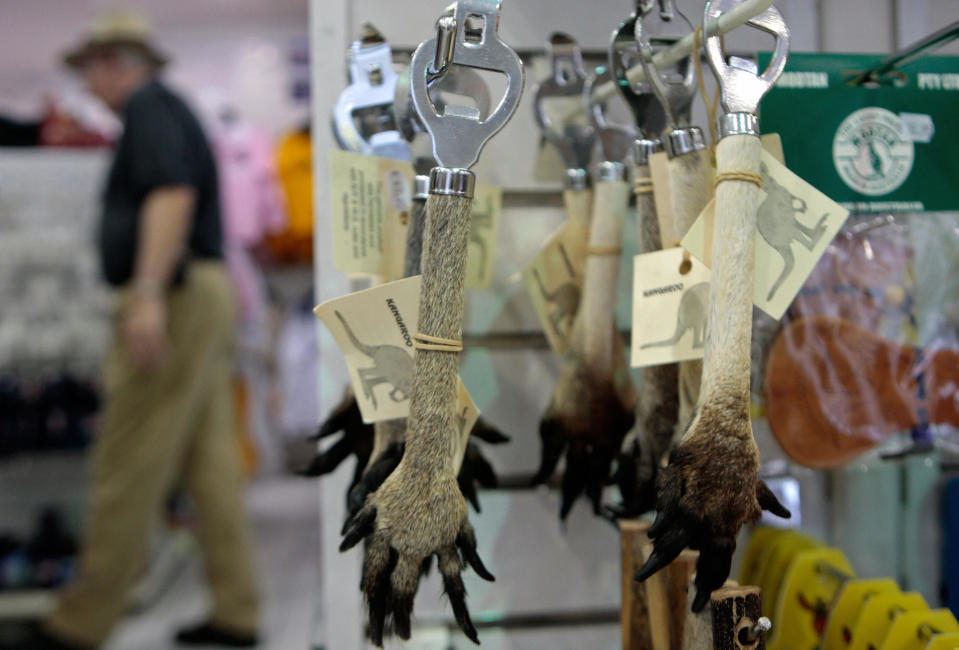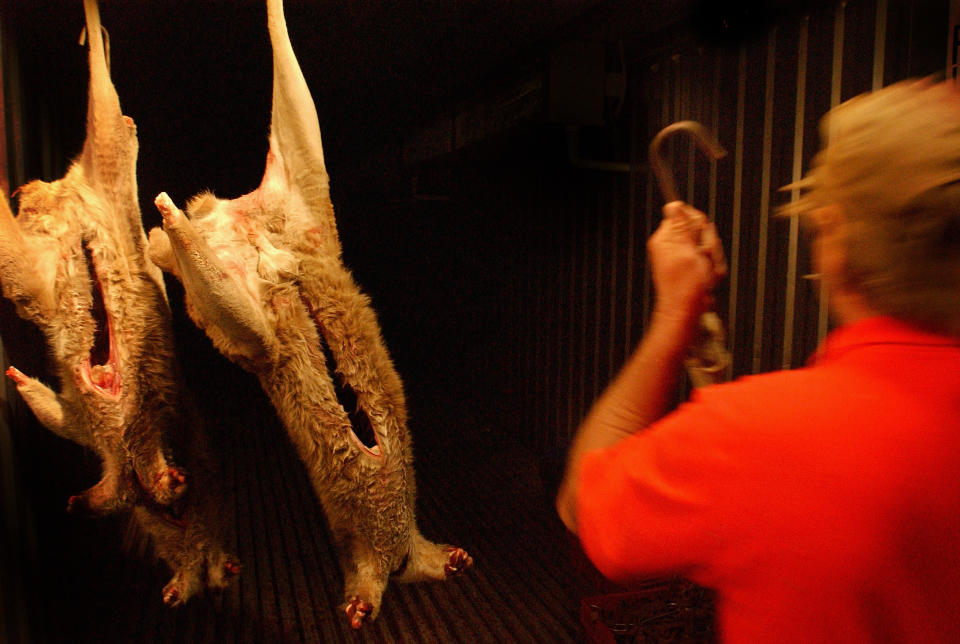'Streets of horror': Wildlife trade continues despite coronavirus warning
WARNING – DISTRESSING CONTENT: Despite evidence the coronavirus pandemic spread to humans due to wildlife consumption, many regions including Africa, South East Asia and Australia are continuing to trade in wild animals.
Disturbing photographs have emerged which indicate West African markets are still selling a variety of exotic species.
The images taken in January this year at Cotonou and Ouidah in Benin show piles of animal parts – including monkey heads, pythons and birds.
One photograph focuses on a dead monkey lying beside the body of a pangolin – the mammal which is thought to have transferred COVID-19 from bats to humans.
Live blog: Coronavirus news and updates

Wildlife not-for-profit World Animal Protection (WAP) told Yahoo News Australia that as of April, wildlife markets continued to operate as normal in both Togo and Benin.
WAP head of wildlife campaigns Cassandra Koenen issued a statement calling for the markets, which service traditional religious practices, be closed.
“This lack of hygiene combined with direct human contact can create a breeding ground for existing and emerging infectious diseases, such as COVID-19,” she said.
“Wild animals belong in the wild, not in conditions like the ones found at these voodoo markets.
“These conditions are cruel incubators for the transmission of disease and the evolution of more virulent pathogens.”


Wildlife trade continues despite concern in 2007
Wet markets – where a mix of species are often kept in cramped, squalid conditions – remain the biggest concern as the unsanitary conditions create an ideal breeding ground for bacteria and viruses.
Researchers have found zoonotic transmission, where pathogens travel from animals to humans, accounts for 75 per cent of emerging infectious diseases.
HIV, SARS and various Ebola outbreaks are all believed to have transferred to humans through the consumption of wild animals.
READ MORE:
'Limit human contact': How pet owners can help keep vets open amid pandemic
When we will know that social distancing measures are working
Following the 2002/2003 global SARS pandemic which killed almost 800 people, Hong Kong scientists published research in 2007 which suggested clamping down on biosecurity in wet markets.
The virus likely began in bats living in China’s Yunnan province and researchers warned the animals were a “natural reservoir for SARS-CoV-like viruses”.


While China clamped down on wildlife consumption after the SARS outbreak, the profitable industry boomed in the years that followed.
It took the COVID-19 pandemic to convince the Chinese government to ban the eating of wildlife, but exceptions remain for traditional medicine.
In early March, the National Health Commission in China was still recommending tan re qing, a herbal medicine containing bear bile, to treat severe cases of COVID-19.
While sources suggest Chinese authorities have since clamped down on wildlife-derived medicines, the NHC did not respond to questions as to whether they have altered their stance on bear bile farms.
Call to end kangaroo consumption in Australia
In an interview with 2GB on Friday morning, Prime Minister Scott Morrison said wet markets were a “very real and significant problem wherever they exist”.
“This virus started in China and went round the world, that’s how it started,” he told radio host Alan Jones.
“We all know that, and these wet markets can be a real problem when it comes to what can occur in those markets.
“And I think from a world health point of view, this is something the World Health Organisation should do something about.”
Animal Justice Party MLC Mark Pearson maintains that despite Australia not having wet markets, the federal government needs to put an end to our local wildlife trade.
Kangaroo meat remains popular both locally and in Europe, but Mr Pearson wants to see Australia crack down on the sale of native animals and launched a petition.

"By allowing the kangaroo trade to continue, the Australian government is sending a clear message that industry is more important than human health,” Mr Pearson said in a statement.
"It's clear that the Australian kangaroo meat industry cannot meet the standards necessary for safe consumption.
"In times of crisis it's easy to reject our own accountability and shift the blame overseas.
“But the rise in emerging zoonotic diseases is a global issue.
“Since this outbreak China has banned the wildlife trade.
“What preventative measures has Australia taken?"

Australia has the distinction of being home to the largest land-based cull of wildlife in the world, with more than 31 million kangaroos slaughtered over the last 10 years.
Kangaroos are considered a pest in many regions, where they are thought by some to compete for food with sheep and cattle and slaughtered for their meat, skins and other body parts.
The Department of Environment told Yahoo News Australia wildlife would remain on the menu in Australia and they had no plans to toughen restrictions.
“No government restrictions have been put in place, or are being considered for wildlife products, including kangaroo meat, meat products and by-products as a result of COVID-19,” a spokesperson said in a statement.
While there is no evidence of viruses being transferred to humans through the consumption of cooked kangaroo meat or the use of their body parts, cases of Q fever are thought to have been acquired through contact with the animals.
Some retailers and regions overseas have banned the consumption of kangaroo meat due to welfare concerns, but Russia is the only country to have restricted sales due to concern about salmonella and E. coli bacteria.
‘Streets of horror’: Wet markets still operating in South East Asia
North of Australia, wet markets are reportedly continuing to flourish, with major stall holders in Indonesia, Cambodia and Vietnam still selling live dogs amd cats as well as wildlife.
Four Paws veterinarian Dr Katherine Polak spoke to Yahoo News Australia from Bangkok as she reviewed investigations from the last week into the live animal trade.
“We’ve sent our local staff into the various markets and to dog and cat meat markets that we know - often wildlife is sold as well,” she said.
“In Indonesia we had our local partner go to North Sulawesi which are the notorious wet markets – and what we found is that it’s business as usual.
“It’s not overly surprising that even in the midst of a pandemic we see things operating relatively unscathed.”

An investigator aligned with Four Paws found in Hanoi social distancing had led to a change in business model, but the trade in “wet meat” was continuing.
“We call them the ‘streets of horror’ – dogs and cats are just being brutally bludgeoned right on the sidewalk,” she said.
“What was interesting is that they really have converted their business model from a dine-in model to a to-go model.
“What we see now are these dozens of people picking up ‘doggy bags’, pardon the pun.”
Four Paws found that with more people staying home, there has been growing interest in “exotic” or “specialist” cuisines in Hanoi.
Dr Polak said they had noted that food delivery apps were now offering dog and cat meat on the menu.
She told Yahoo News Australia many of the providers had no reviews, which led them to believe they were recent listings which have popped up to ensure the supply of dog and cat meat.
“It’s really just a service model that’s adapted to the COVID-19 situation,” Dr Polak said.
Do you have a story tip? Email: newsroomau@yahoonews.com.
You can also follow us on Facebook, Instagram and Twitter and download the Yahoo News app from the App Store or Google Play.


